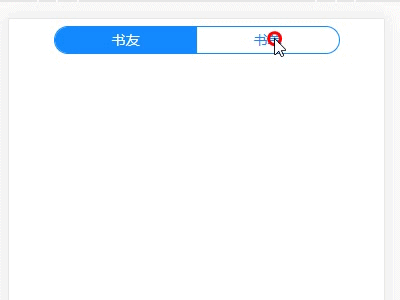原生JS封装vue Tab切换效果
本文实例为大家分享了原生JS封装vue Tab切换的具体代码,供大家参考,具体内容如下
先看效果图
vue,js,css3
vue组件 可以直接使用
<template>
<div class="bookcircle-header">
<ul class="wrapper" :class="headerActive == 0 ? 'friend' : 'booklist'">
<li @click="headerChange(0)" :class="headerActive == 0 ? 'active' : ''">
书友
</li>
<li @click="headerChange(1)" :class="headerActive == 1 ? 'active' : ''">
书单
</li>
</ul>
</div>
</template>
<script>
export default {
components: {},
data() {
return {
headerActive: 0,
};
},
computed: {},
created() {},
mounted() {
//初始化抛发
this.$emit("change", this.headerActive);
},
methods: {
headerChange(index) {
this.headerActive = index;
this.$emit("change", index);
},
},
};
</script>
<style lang="less" scoped>
.bookcircle-header {
height: 42px;
display: flex;
justify-content: center;
align-items: center;
.wrapper {
width: 286px;
font-size: 14px;
height: 29px;
color: #1489fe;
border: 1px solid #1489fe;
border-radius: 14px;
display: flex;
justify-content: center;
align-items: center;
position: relative;
box-sizing: border-box; // 解决边框溢出,将border包含在盒子内部
li {
flex: 1;
height: 100%;
display: flex;
justify-content: center;
align-items: center;
z-index: 2;
}
.active {
color: white;
}
&::before {
content: "";
width: 143px;
height: 100%;
background-color: #1489fe;
position: absolute;
top: 0px;
left: 0px;
border-radius: 13px 0px 0px 13px;
z-index: 1;
transition: all 0.3s;
}
&.firend::before {
transform: translateX(0);
border-radius: 13px 0px 0px 13px;
}
&.booklist::before {
transform: translateX(100%);
border-radius: 0px 13px 13px 0px;
}
}
}
</style>
实现原理:
使用ul,li以及弹性盒子,首先给父元素设置宽高,然后通过弹性盒子将子元素 li 水平方向展开, 给子元素 li 设置 flex:1,让子元素平分父元素的宽。
然后给父元素设置伪元素,以绝对定位的方式覆盖第一个 li 元素, 通过z-index属性,控制伪元素和子元素的层级显示关系。
然后给伪元素设置 transition 属性 搭配 transform: translateX(); 属性,让元素水平移动就可以了
注意点:
1、虽然切换的点击事件在子元素上,并且也给子元素添加 了active样式,但tab的切换效果并不是通过子元素来实现的,而是通过父元素的伪元素来实现切换效果。
2、必须要根据子元素的 index 给父元素设置动态class, 这样父元素的伪元素才能根据选中的子元素执行切换动画
3、本组件使用的是 淘宝amfe-flexible、 postcss适配,使用时注意适配问题
相关文章
Sally
2021-01-16
Rosalia
2020-02-03
Claire
2021-05-21
Yvonne
2023-07-20
Rasine
2023-07-20
Zahirah
2023-07-20
Tina
2023-07-20
Kande
2023-07-20
Rae
2023-07-20
Flower
2023-07-20
Heather
2023-07-20
Vala
2023-07-20
Tertia
2023-07-20
Fredrica
2023-07-20
Bree
2023-07-20
Katherine
2023-07-20
Genet
2023-07-20
Orianna
2023-07-20
Gella
2023-07-20